Inbound marketing leads cost 61% less than outbound leads. Yes, you heard that right, marketers—it’s no wonder inbound marketing techniques have become hot discussion topics!
In today's fast-paced digital landscape, where customers are inundated with information and choices, mastering the art of effective marketing has never been more crucial. Inbound marketing strategies have emerged as a beacon of light in a sea of marketing noise.
These strategies represent a shift from traditional, interruptive approaches to a customer-centric philosophy that resonates with the modern consumer. In this article, I’ll be exploring inbound marketing and unveiling the best techniques that empower businesses to attract their target audience like never before. But, first things first.
What Is Inbound Marketing?
Inbound marketing is a marketing methodology that focuses on attracting customers through valuable and relevant content, rather than interrupting potential customers with traditional advertising methods. It is designed to draw a carefully segmented group of potential customers to your brand by providing them with information, resources, and solutions that address their needs.
In contrast to outbound marketing and traditional marketing, which involves pushing promotional messages out to a wide audience through channels like TV ads, cold calling, and direct mail, inbound marketing aims to create a more personalized and engaging experience for potential customers.
Inbound marketing aims to establish a strong brand presence, build trust, and cultivate long-term relationships with customers by providing them with valuable information and solutions throughout their buying journey. It is often associated with the concept of "permission marketing," where customers actively give permission for brands to communicate with them based on their demonstrated interest and engagement.
Inbound Vs Outbound Marketing
Inbound and outbound marketing are two distinct approaches to reaching and engaging with an audience, each with its own set of strategies and advantages. Like I said, inbound marketing focuses on drawing potential customers in by creating valuable content and experiences that address their needs and interests. It's customer-centric, aiming to provide helpful information and build trust with the audience. Also, this strategy tends to have a lower cost per lead compared to outbound marketing! Save that money for your PSL.
On the other hand, outbound marketing uses more traditional marketing tools, where businesses initiate contact with potential customers. This approach often involves paid advertising, cold calling, direct mail, and email blasts. Think about the times when you were little, the phone would ring during family dinner, and someone would answer it just to shout “take me off the call list!” Save your sales team from that, please!
Outbound marketing is interruptive in nature, as it attempts to capture the audience's attention at the top of the marketing funnel, sometimes without knowing if they have any interest in the product or service you’re providing. While outbound marketing can provide immediate results and reach a broader audience, it is typically associated with higher costs per lead and lower conversion rates compared to inbound marketing.
The choice between inbound and outbound marketing depends on various factors, including the target audience, industry, budget, and goals. Many businesses today find success by combining elements of both approaches into a comprehensive marketing strategy, creating a more balanced and effective way to reach and engage with their audience. Ultimately, the key is to strike a balance that aligns with your specific business objectives and ensures a meaningful connection with your ideal customers and a better customer experience.
Why Is Having An Inbound Marketing Strategy Important?
HubSpot, one of the best digital marketing software, says something pretty mind-blowing. They found that 80% of companies using inbound marketing see more people visiting their websites, and 75% get more customers purchasing something. Not only that, inbound marketing costs around 62% less than outbound marketing, and scores you three times more leads!
You’ll also find that your company will achieve long-term results and increase brand authority. That’s because inbound marketing efforts, such as real-time content creation and SEO optimization, have a cumulative effect. Over time, your content can continue to attract and convert leads, providing a sustainable source of growth and ROI. Unlike outbound marketing, where results often diminish once the campaign ends, successful inbound marketing can yield ongoing benefits.
Consistently delivering valuable and informative content positions your brand as an industry authority. When customers perceive your business as a trusted source of information, they are more likely to turn to you when making purchasing decisions, which can lead to increased brand loyalty, market influence, and bring in new customers.
The Best Inbound Marketing Strategies And Tactics For SaaS
Content Marketing
Content marketing can be succinctly defined as the practice of sharing written and visual content on the internet to draw in potential leads for your business. This encompasses all different types of content, such as blog articles (pillar pages and cluster content), podcasts, eBooks, webinars, infographics, videos, and various other formats of content.
Pillar pages and cluster content are integral to content marketing's success. A pillar page is a comprehensive, authoritative piece of content that covers a broad topic in depth. It serves as the cornerstone for a specific subject on a website. Cluster content, on the other hand, consists of interconnected, smaller pieces of content that delve into specific subtopics related to the pillar page! Both of these better your website’s SEO and solidify you as an expert.
Social Media and Influencer Marketing
Short form video is the single biggest trend on social media platforms right now. Notably, it stands out as the most potent and financially rewarding, delivering the highest return on investment (ROI).
Adding to its allure, short-form video is poised for remarkable expansion in 2023, eclipsing all other trends in terms of planned investments by marketers. An impressive 90% of those already utilizing short-form video on intend to bolster or sustain their investments in the coming year, attesting to its enduring appeal. Furthermore, 21% of marketers are gearing up to embrace short-form video for the first time in 2023, marking it as the most attractive newcomer among emerging trends.
Short form video can be combined with influencer marketing to capitalize on the two most lucrative ROI trends simultaneously. What's even more noteworthy is that a consumer trends survey reveals that within the last three months, 33% of Gen Z consumers have made purchases based on influencer’s social media posts. When it comes to decision-making, Gen Z places influencer endorsements above suggestions from friends and family, underlining the growing significance of influencer marketing in today's landscape.
With social media marketing and influencer marketing, depending on your marketing goals, be sure to track metrics like, organic reach, impressions, engagement, clicks, and leads generated from the outlet!
Search Engine Optimization (SEO)
Although not a new concept, harnessing a blog in conjunction with a proficient SEO strategy remains in the marketing arsenal, drawing in 29% of marketers for lead generation and conversion.
By optimizing your content and website structure for specific keywords and phrases, SEO makes sure that your web page appears at the top of search engine results when qualified leads seek information or products related to your industry. SEO also establishes your brand's presence throughout the entire consumer purchasing journey. This strategic advantage ensures that your marketing efforts align seamlessly with the customer journey.
Indeed, customer behavior has undergone lasting transformations, as even acknowledged by Google. As of July 2023, Google commands an impressive 92.08% share of the global search engine market. Furthermore, a notable shift in consumer behavior involves their preference for independently navigating a significant portion of the purchasing process.
For instance, a striking 86% of consumers consider search engines their primary source of information. This trend transcends generational divides, as individuals across all age groups overwhelmingly rely on search engines to procure answers and insights online.
Email Marketing
There are over 4.3 billion email users worldwide and seemingly just as many marketing emails in my inbox post-Labor Day weekend with “Our Sale Has Been Extended!” subject lines screaming at me.
It may not seem like a good idea to add to the seemingly unending stream of emails in customer’s inboxes. However, according to Constant Contact, the average ROI for email marketing is $42 for every $1 spent. Like, woah.
Email marketing exhibits versatility in its various forms. Campaigns range from a single email for announcing new content, to the consistent delivery of an ongoing newsletter, or even reaching out to customers regarding product updates. Email marketing ranks as the third most utilized marketing channel, behind only social media and websites.
When you’re executing an email campaign, be sure to measure your open rate and click through rate. Pro inbound marketing tip: If your open rate is low, try making your subject line more enticing!
Examples Of Great Inbound Marketing Campaigns In SaaS
Hubspot: Content Marketing
HubSpot is an all-in-one inbound marketing, sales, and CRM platform that provides businesses with a suite of tools and services to attract, engage, and delight customers. Founded in 2006, HubSpot is renowned for pioneering the concept of inbound marketing, emphasizing the creation of valuable, customer-centric content to drive organic growth and build lasting relationships with clients.
Their content is meticulously crafted to address the pain points, questions, and needs of their target audience, which predominantly consists of marketers and businesses. By offering a wealth of free, high-quality resources, such as blogs, eBooks, webinars, and tools, HubSpot establishes itself as a trusted source of information, nurturing long-term relationships with its audience.
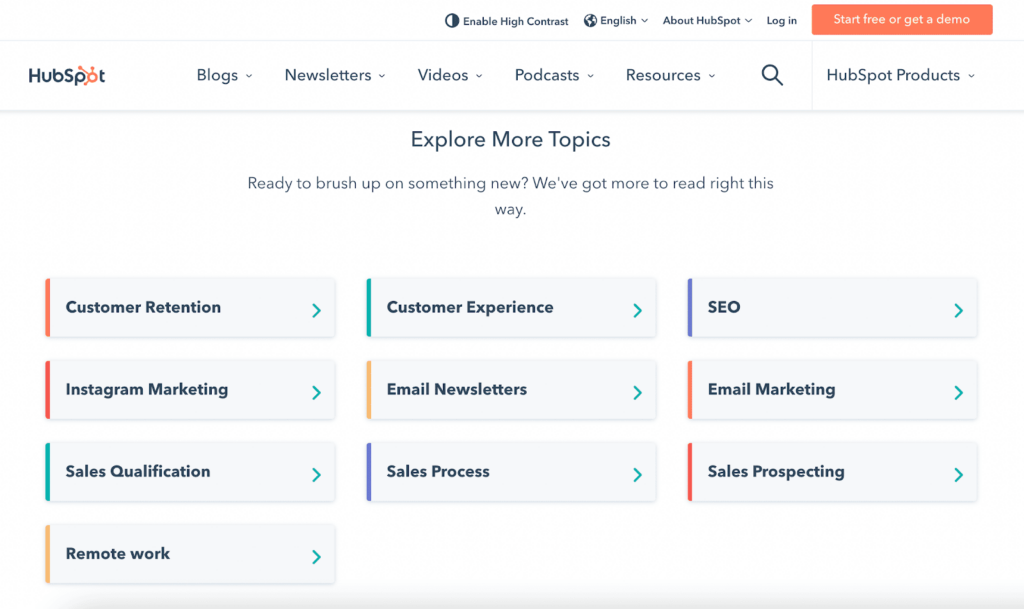
One of the standout features of HubSpot's content marketing is their commitment to education. They offer comprehensive courses and certifications on inbound marketing, content strategy, SEO, and more through their HubSpot Academy. This dedication to empowering their audience with knowledge not only positions HubSpot as an industry leader but also cultivates a community of skilled professionals who are more likely to adopt their digital marketing software solutions.
Notion: Social Media and Influencers
Notion is a versatile productivity tool that combines elements of note-taking, project management, database organization, and more into a single, integrated platform. Founded in 2013, Notion has gained widespread popularity for its flexibility and customizable features, allowing users to create and organize content in ways that suit their unique needs.
Notion shines in their use of creators and influencers. They have a curated library of templates that the company created, and also include creator collaborations where organization or productivity influencers make their personal templates available for use. On LinkedIn, they repost professionals that create Notion productivity content and hacks. On Twitter, they retweet and engage with influencers when there’s a big launch and even shout out their ambassadors in the original launch tweet! This all increase word of mouth buzz surrounding the product.
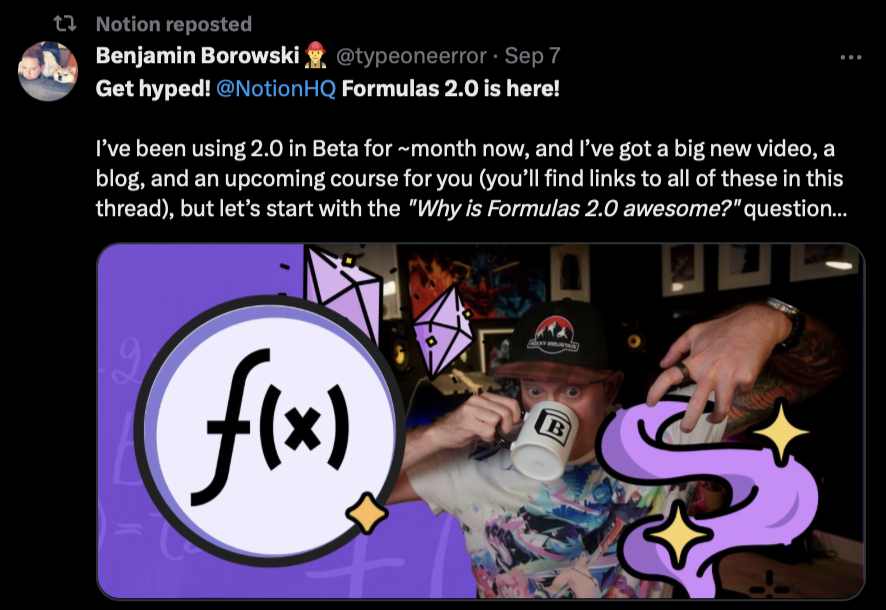
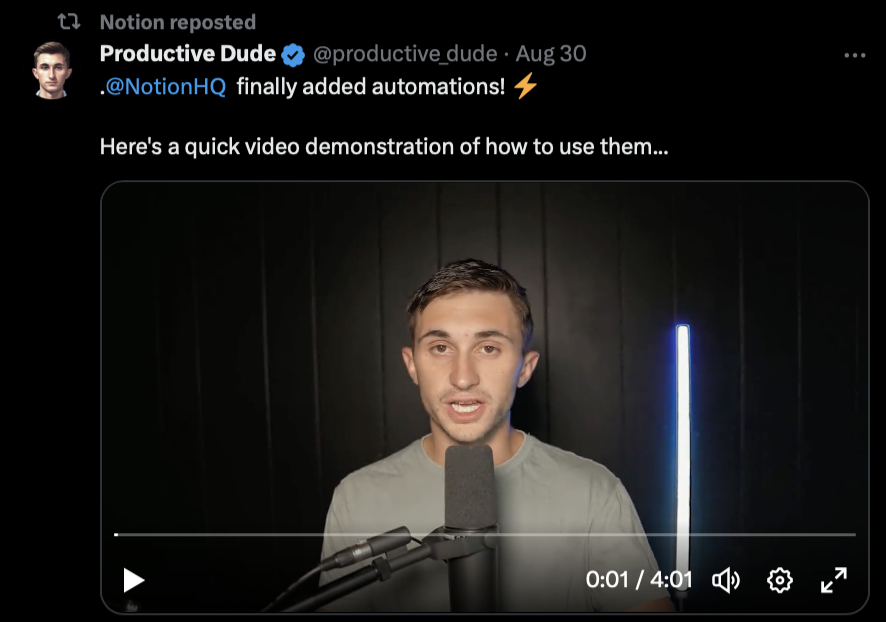
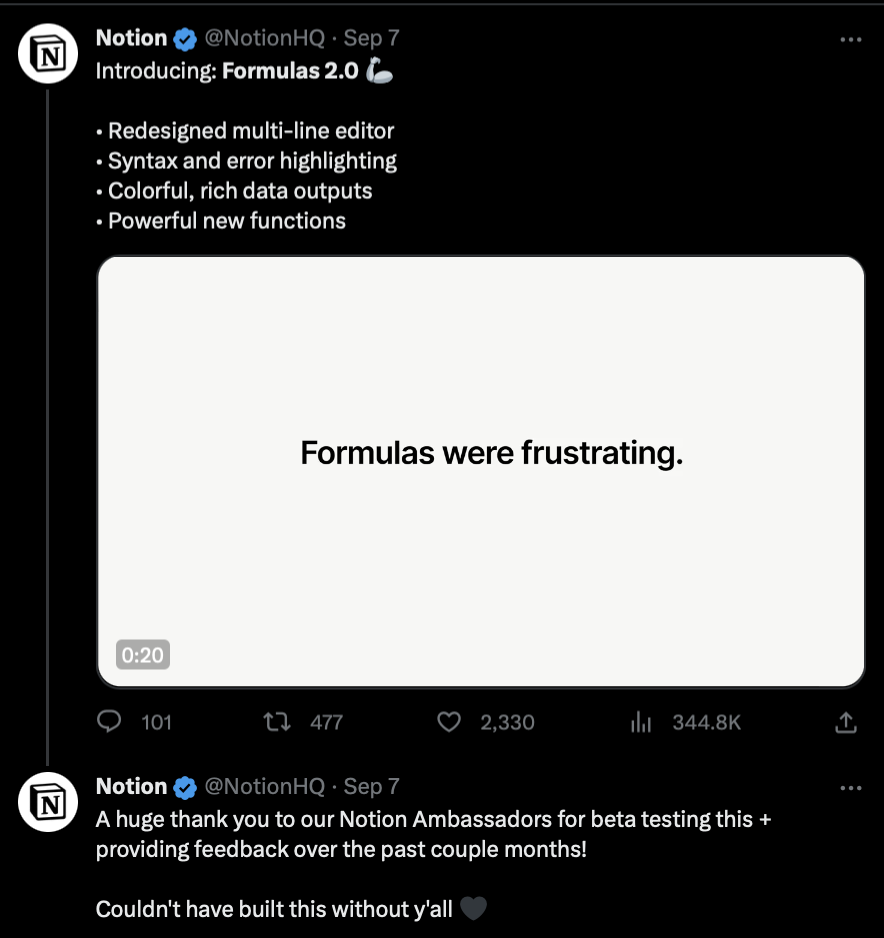
Using influencer marketing is a savvy strategy for Notion as it can help amplify their brand's reach and credibility within the tech and productivity niche. By partnering with influencers who have a strong presence and following in the digital productivity space, Notion can tap into a ready-made audience of potential users who are already interested in organization and productivity tools. These influencers can authentically showcase to their subscribers how Notion can improve users' lives, offering practical insights and use cases that resonate with their followers. Furthermore, influencer marketing can humanize the brand, making it more relatable and approachable, which can be particularly beneficial in the tech industry.
Zapier: SEO
Zapier was founded in 2011 and primarily caters to small and medium-sized Businesses. The platform specializes in app integration and automation, boasting integration with over 3,000 apps. In the world of SaaS marketing, effective strategies often revolve around the incorporation of SEO principles. Zapier's standout campaign centered on a robust SEO approach.
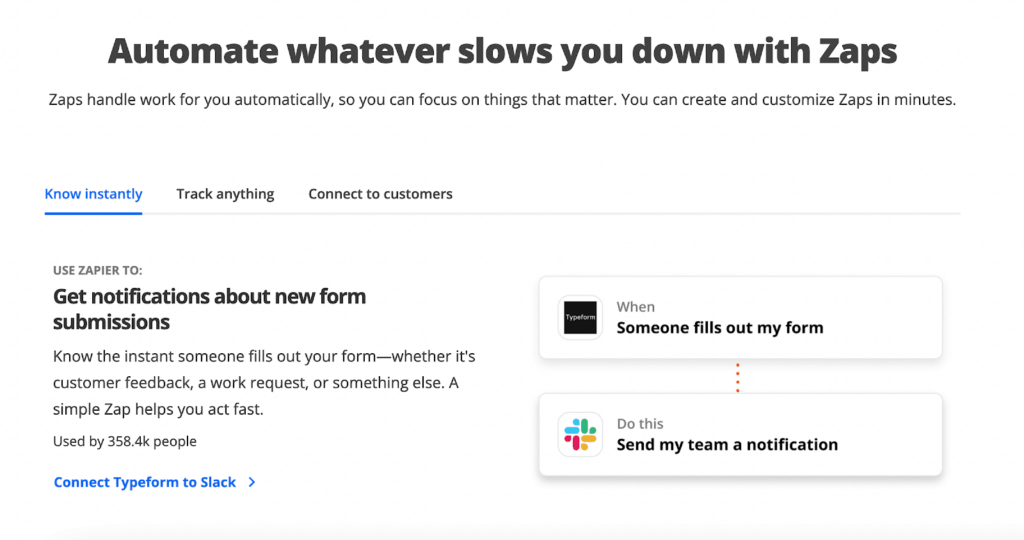
The cornerstone of Zapier's strategy was the creation of a staggering 25,000 landing pages, all ranking among Google's top 100 results. To maintain this substantial volume while outshining competitors, Zapier tapped into their partner resources to craft unique pages for each app, integration possibility, and workflow variation. To ensure content originality, they incorporated context-specific Call to Actions (CTAs), effectively bypassing the common issue of repetitive content. As part of their strategy, Zapier also underwent a rebranding effort, transitioning from "Zapier" to the more concise "Zap." This shift not only simplified their brand but also seamlessly integrated the new "Zap" logo into their marketing endeavors, earning praise for its simplicity and memorability.
In today's fiercely competitive landscape, SEO campaigns have become a critical imperative for brands aiming to excel in their respective niches. By constructing robust SEO strategies and producing high-quality content, forward-thinking companies like Skale have managed to achieve extraordinary results, such as a staggering 568% increase in qualified organic clicks for their clients. It's a testament to the enduring power and necessity of well-executed SEO endeavors.
Shopify: Email Marketing
Shopify sets a stellar example with its well-crafted welcome email. Recognizing that first impressions are irreplaceable, Shopify places great emphasis on this initial point of contact. They understand that laying a robust foundation is pivotal for nurturing enduring customer relationships. Regrettably, many businesses overlook this invaluable opportunity, dispatching lackluster welcome emails. Shopify's approach, however, stands out.
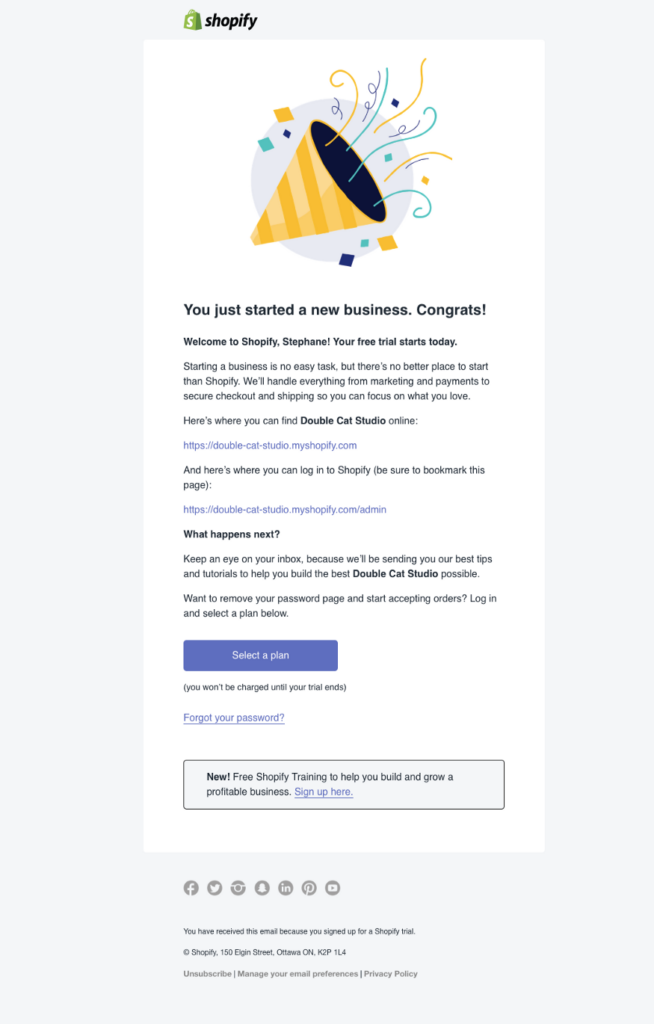
The email goes the extra mile by addressing the recipient by their name, a seemingly simple gesture that goes a long way in establishing trust. Sometimes overlooked, expressing gratitude is an essential component of proper email etiquette. Shopify courteously thanks the customer for choosing their platform or service, setting a positive tone at the start of the buyer’s journey.
In addition to its polite tone and personalized touch, Shopify's email is informative. It highlights the benefits of their product and informs the customer about forthcoming practical information and tips. By managing expectations from the outset, Shopify creates a transparent and trustworthy experience for their inbound strategy.
So What Now?
How will you use these powerhouse inbound marketing tactics? Will you start a podcast or video series about your startup strategy? Maybe hire an influencer to do it for you? Or will you look at your email strategy and revamp? SEO may also look appetizing for your digital marketing strategy! Whatever you end up doing to raise brand awareness, start with one, perfect it, and grow from there!
Don’t forget to subscribe to The CMO newsletter for all the latest in marketing.


